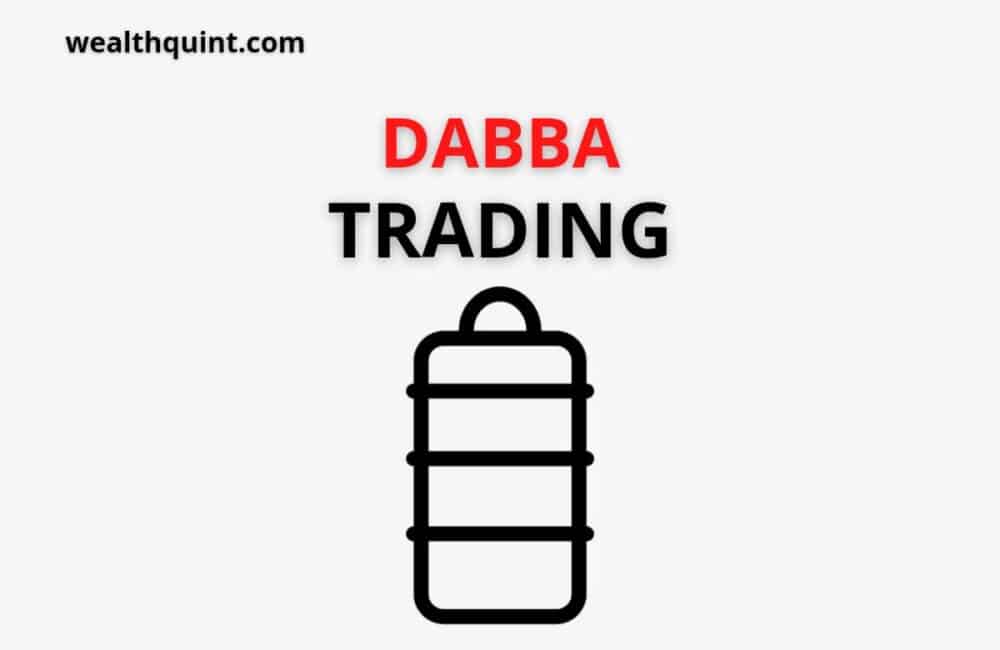Bucketing Or Dabba Trading has evolved around the years. Today, individuals see the stock market as a major avenue to invest. Nifty and Sensex both are touching zenith these days. Henceforth, this drives the investors towards the stock markets to take benefits out of it.
Also, to trade Or invest in the stock market, the investors need to begin with a Demat account with the help of a broker. The investor takes a separate route like bucketing to carry out their trades in the market.
In this type of trading, the operator works in a market, which is risky yet profitable. This market has its own set of norms and regulations. The transactions of this trading are settled in cash every week.
In this article, we would learn more about the Dabba trading culture. Let us first understand its meaning.
What Is Dabba Trading?
Dabba trading is a system of guidance, where the broker or the dealer gives a roadmap to the investors, to maximize their returns.
Dabba trading is nothing but a proxy illegal market that has its own set of regulations and norms. The bucketing is authorized by the alterations in the price of commodities and shares in the stock market.
Dabba Trading is a process by which a specific dealer guides a customer to trade outside the share market. It serves as an operator who wants to operate outside the regular market zone. The investors are required to put their orders with the brokers and the orders occur in the Demat account.
Also Read: Difference Between Demat Account and Trading Account
How Dabba Trading Works?
In this process, the broker pitches the client to invest outside the stock market. The bucketing is nothing but an operator who works away from the business areas. In the real trade, the investors generally place the order with the broker and things take place accordingly in the Demat account.
However, in Dabba trading, the investor places the order with the operator itself. After seeing the order, the operator records the transaction in his register or his book. The operator also takes the required amount of money to invest in the trade. This transaction takes place outside the stock exchange market and the operator acts as a counterparty here.
Here, the operator acts are known to bear the profits and losses. He also functions on an assumption that few of the clients would have to bear the loss while some would yield profits.
Dabba Trading Example
Let’s say an investor purchases a nifty call option with a lot of 50 shares at ₹80. Now here the investor is required to pay ₹4000 to the operator. In case nifty goes down and the investor wants to sell the call option that he bought earlier for ₹50. The operator would now return ₹1500 to the investor.
The profit earned by the operator here is ₹4000 – ₹2500, which comes to ₹1500. The risk here is that if the operator bears continuous losses, it would force him to shut down his shop. Hence, there are high chances that he can now run away with all the money that is left with him. It could lead to heavy losses for the investors.
From the aforementioned example, you might have an idea of how bucketing occurs.
Also Read: 20 Must Watch Stock Market Movies Every Investor
Dabba Trading Brokers
Dabba trading brokers are mostly SEBI registered firms that provide advertisements that claim some ‘multi bagger’ returns in a super short period. These firms are small places that get all the clients registered on their application and accept payments via UPI Or cash.
Risks Related To Dabba Or Box Trading
Her x the operator is responsible for both losses and rewards. When it comes to bucketing, the operator has an assumption that only a few customers would bear losses while others would surely gain something.
It is a type of trade that includes a counterparty investigation and threat by agencies such as SEBI. Dabba trading can sometimes also force an operator to wind off his business if he is facing losses regularly. This can lead him to vanish with all the funds that he possesses.
Box Trading Platforms & Applications
This investment sector has reached a certain stage, where operators can now utilize Dabba trading platforms and applications. The operators utilize an integrated software platform to finish off with the transactions for a variety of individuals.
The interface of these applications is curated in such a way that reduces the expenses of manual resources. As much as this sector is growing, the number of Dabba traders is also growing significantly.
Furthermore, the bucket trading platforms and applications are curated to assist various clients from several areas of the country. To navigate the current pricing policies, the operators now trade via these applications which are related to commodity and equity markets.
Also Read: What is Nifty Bees & How to trade Nifty Bees on Zerodha?
Major Locations For Dabba Trading
Some of the major and the most crucial locations where Dabba trading is famous are Guwahati, Delhi, Kochi, Kolkata, Lucknow, and Jodhpur.
Why Is Dabba Trading Not Allowed In India?
Dabba trading is banned in our country due to the following factors:
- Profits may be utilized in drug trafficking or terrorism.
- The KYC rules are not allowed in terms of this trading.
- Dabba traders run away with clients when things don’t work accordingly.
- Evasion of profits and tax income isn’t reflected.
- The tendency of black money gets routed.
Moreover, it’s always advised to not invest in the Dabba trade market due to the high risk of losing all the money. This was all about Dabba trading or the box market. We hope that you now know enough about it. Let us know your views in the comment section below.
Recommended:
Old Money Vs New Money: Which One is Better?
Frequently Asked Questions
Is Dabba Trading Legal?
No, bucketing or Dabba trading is illegal in India.
Who Operates Bucketing?
There are a lot of operators who deal in bucketing.
Does Dabba Trading Take Place In The Commodity Market?
Yes, there are a few traders who are active in the commodity market.
Is Online Dabba Trading Possible?
Yes, today, there are a lot of online software platforms where Dabba trading is possible.
What Is One Major Risk Is Bucketing?
You can lose your money in this type of trading.



